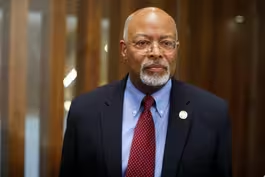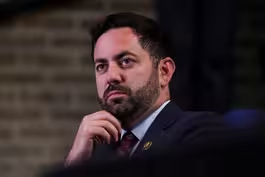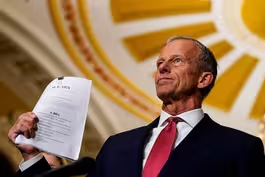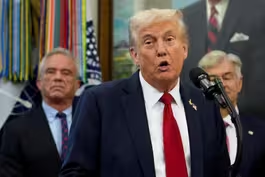
Trump hints at military deployment in U.S. cities
Clip: 9/30/2025 | 9m 47sVideo has Closed Captions
At gathering of military leaders, Trump hints at deployment in U.S. cities
President Trump and Defense Secretary Pete Hegseth spoke to nearly the entire senior officer corps of the military. It was an unprecedented gathering at a Marine base south of Washington. Hegseth announced new directives, and the president laid out a vision to use the military not against overseas enemies, but for threats he sees here at home. Nick Schifrin discussed more with Margaret Donovan.
Problems playing video? | Closed Captioning Feedback
Problems playing video? | Closed Captioning Feedback
Major corporate funding for the PBS News Hour is provided by BDO, BNSF, Consumer Cellular, American Cruise Lines, and Raymond James. Funding for the PBS NewsHour Weekend is provided by...

Trump hints at military deployment in U.S. cities
Clip: 9/30/2025 | 9m 47sVideo has Closed Captions
President Trump and Defense Secretary Pete Hegseth spoke to nearly the entire senior officer corps of the military. It was an unprecedented gathering at a Marine base south of Washington. Hegseth announced new directives, and the president laid out a vision to use the military not against overseas enemies, but for threats he sees here at home. Nick Schifrin discussed more with Margaret Donovan.
Problems playing video? | Closed Captioning Feedback
How to Watch PBS News Hour
PBS News Hour is available to stream on pbs.org and the free PBS App, available on iPhone, Apple TV, Android TV, Android smartphones, Amazon Fire TV, Amazon Fire Tablet, Roku, Samsung Smart TV, and Vizio.
Providing Support for PBS.org
Learn Moreabout PBS online sponsorshipAMNA NAWAZ: Today, President Trump and Defense Secretary Pete Hegseth spoke to nearly the entire senior officer corps of the military.
It was an unprecedented gathering at a Marine base just south of Washington.
GEOFF BENNETT: Hegseth announced new directives and, as Nick Schifrin reports, the president laid out a vision to use the military not against overseas enemies, but for threats he sees here at home.
NICK SCHIFRIN: Today, speaking to a sea of generals and admirals whose experience was forged by two decades of foreign wars, the commander in chief said their chief enemy was domestic.
DONALD TRUMP, President of the United States: We should use some of these dangerous cities as training grounds for our military, National Guard, but military.
NICK SCHIFRIN: The Trump administration has deployed active-duty Marines and National Guard to Los Angeles, as well as Guardsmen to Washington, D.C., but they have spent more time strolling than training, and President Trump vows to deploy troops into Chicago, Memphis and Portland.
DONALD TRUMP: Defending the homeland is the military's first and most important priority.
That's what it is.
Only in recent decades did politicians somehow come to believe that our job is to police the far reaches of Kenya and Somalia, while America is under invasion from within.
NICK SCHIFRIN: For years, the senior officers in today's room not only led troops in Iraq and Afghanistan and special operations forces troops across more than 80 countries; they have also been trained and educated all their careers to believe the U.S.
military should not be deployed against fellow Americans.
And the few exceptions have been managed by the National Guard, who outside of D.C.
are led by state authorities.
But that is not President Trump's vision.
DONALD TRUMP: It's a war from within.
Controlling the physical territory of our border is essential to national security.
NICK SCHIFRIN: And, this morning, he warned what would happen to officers who resist.
DONALD TRUMP: I'm going to be meeting with generals and with admirals and with leaders.
And if I don't like somebody, I'm going to fire them right on this spot.
PETE HEGSETH, U.S.
Defense Secretary: But if the words I'm speaking today are making your heart sink, then you should do the honorable thing and resign.
NICK SCHIFRIN: For 45 minutes before President Trump, Secretary Pete Hegseth told the gathered generals and admirals that he was, in his words, ending the war on warriors.
PETE HEGSETH: In many ways, this speech is about fixing decades of decay.
NICK SCHIFRIN: Hegseth today issued 11 new memorandums, many about fitness, requirements for each combat specialty changed to -- quote -- "the highest male standard only" Physical fitness tests for all service members would be changed to -- quote -- "male standards," and grooming requirements would be enforced.
PETE HEGSETH: It's tiring to look out at combat formations, or really any formation, and see fat troops.
Likewise, it's completely unacceptable to see fat generals and admirals in the halls of the Pentagon and leading commands around the country in the world.
It's a bad look.
It is bad and it's not who we are.
NICK SCHIFRIN: Hegseth also vowed to overhaul equal opportunity, military equal opportunity, and the inspectors general who investigate misconduct.
Hegseth has long argued that the Biden administration was too focused on ensuring military diversity.
But critics of today's speech say Hegseth's version of lethality is misdefined.
CAPT.
HAILEY GIBBONS (RET.
), U.S.
Army Ranger: By changing the standard to the highest male combat arms physical fitness, lethality would go down, because talent would decrease.
NICK SCHIFRIN: Hailey Gibbons is a former Army Ranger who met the same requirements as male Rangers and says there should be different requirements for different military occupational specialties, known as MOSes.
CAPT.
HAILEY GIBBONS (RET.
): Having different standards for different MOSes allows for creative minds, intelligent people, specialized skills.
One of the main aspects of lethality is unit cohesion, and that is built on trust, shared hardship, and leadership, not if you can deadlift a 350-pound barbell.
NICK SCHIFRIN: Hegseth has fired the top U.S.
general, who is Black, and the Navy's top admiral, who's a woman.
He said they and others went too far in embracing -- quote -- "woke policies."
But Gibbons says the Army defines leadership differently.
CAPT.
HAILEY GIBBONS (RET.
): Being a leader is influencing people, giving them purpose, direction, and motivation to accomplish a goal.
By not creating space for diverse minds, different backgrounds, different genders, we are narrowing our ability to operate effectively.
NICK SCHIFRIN: It is not clear how much today is gathering cost, but given that generals and admirals flew from around the world, some estimates run in the millions of dollars.
For more perspective, we turn to former Captain Margaret Donovan.
She's a former assistant U.S.
attorney and Army lawyer who deployed to Iraq and Syria, where she provided legal advice on more than 1,000 airstrikes and other lethal engagements.
She's now in private practice and a visiting lecturer at Yale Law School.
Thanks very much, Margaret Donovan.
Welcome to the "News Hour."
What's your reaction to President Trump's comments that I played earlier in the story that - - quote -- "We should use some of these dangerous cities as training grounds" for our military, our National Guard?
CAPT.
MARGARET DONOVAN (RET.
), U.S.
Army: Sure.
I think my reaction is probably a combination of shock and embarrassment.
On one hand, you have the secretary of defense, who is saying lethality, lethality, lethality.
He wants the troops to be more lethal.
And then on the other hand, you have the president of the United States saying, I want training to happen in American cities.
So how exactly are they going to train the military on becoming more lethal in American cities?
None of that makes sense.
It's extremely dangerous and troops should not be normalizing that behavior.
NICK SCHIFRIN: But if the president is going to deploy the U.S.
military into these cities, and he's already done that, and he's got a series of cities that he vows to do that again, why not make training part of that mission as well?
CAPT.
MARGARET DONOVAN (RET.
): Because the military is not designed for domestic operations.
Law enforcement is designed for keeping cities safe, crowd control, the things that I think is what the administration wants to use it for.
Let me explain that, when the military deploys, for example, before a unit goes on a combat deployment, they receive training on the rules of engagement.
They learn about, for example, what is the declared hostile force?
Who can we kill and how can we kill them?
How do we engage the enemy, right?
They're not receiving training on how to apply the First Amendment to protesters in a foreign country.
So we can't accept the military to understand how to apply what would normally be overseas rules of engagement to a domestic training environment like the United States with its constitutional protections of its citizens.
NICK SCHIFRIN: Stepping back, how unusual is it, how much does it go against the norms of decades of training and education that the generals and admirals who are in Quantico today -- that the commander in chief says -- quote -- "The military's first and most important priority is defending the homeland"?
CAPT.
MARGARET DONOVAN (RET.
): You know, I think the military's priority is defending the homeland, but the problem is the military's priority is protecting American citizens.
American citizens are not the enemy.
And the message that the president seems to be sending is that there is an enemy within.
That is not true.
Soldiers are training to protect American citizens from foreign adversaries.
They're training to defend the Constitution.
So, that is incorrect to say that the enemy is in the country.
And that is something that the military has to be prepared for.
It stands against everything, every norm, every ethic, every moral that these military commanders have developed learned and hopefully imposed on their junior soldiers throughout their careers.
NICK SCHIFRIN: To your point, after the attacks on Pearl Harbor and 9/11, Congress passed laws that demanded the president use the military for forward defense, of course, the idea being that, if we attack them there, we will not be attacked at home.
Again, how different is President Trump's vision of the military from those two historical examples?
CAPT.
MARGARET DONOVAN (RET.
): Yes, precisely.
We're talking about foreign adversaries, right?
We want to be able to defend the homeland from foreign adversaries, from foreign threats.
What he's talking about now, or what he seems to be alluding to, is some type of internal enemy that doesn't actually exist, right?
Soldiers need to remember, when they're seeing this on TV, when they're getting their training, what is the oath that they took?
Who are they sworn to protect and defend?
What are they supposed to do to uphold the Constitution?
These are the questions that they need to be asking themselves when they receive orders that they question are unlawful.
And I imagine that the commanders who heard that speech today are wondering the exact same thing.
What am I supposed to tell my soldiers that the president is going so far off-base?
And the other thing that you should remember is, this is a president who has really a passing understanding of what the military is about, right?
Everything that he's learned about the U.S.
military, he has learned from the movies.
So, it's kind of no surprise that he doesn't really know what he's talking about, that he thinks you can direct the military to do this or that and not stay in accordance with the law and the constitutional intent for the military, for example, that only Congress can declare war.
So it's kind of no surprise that he's misdirected here.
And you just hope that the senior military officials recognize that and can respond accordingly with the leadership skills that they have.
NICK SCHIFRIN: Margaret Donovan, former JAG and of Yale Law School, thank you very much.
CAPT.
MARGARET DONOVAN (RET.
): Thank you.
Dems. fighting to avoid health care cuts, says Rep. Ivey
Video has Closed Captions
Clip: 9/30/2025 | 6m 2s | Democrats battling with GOP to avoid 'devastating' health care cuts, Rep. Ivey says (6m 2s)
GOP Rep. Lawler: Democrats 'hypocritical' to risk shutdown
Video has Closed Captions
Clip: 9/30/2025 | 5m 16s | Rep. Lawler calls Democrats 'hypocritical' to risk shutdown over health care subsidies (5m 16s)
Government moves toward shutdown with Congress in deadlock
Video has Closed Captions
Clip: 9/30/2025 | 10m 19s | Government barreling toward shutdown with Congress in partisan deadlock (10m 19s)
New book explores how colleges are encouraging free speech
Video has Closed Captions
Clip: 9/30/2025 | 8m 25s | In 'Terms of Respect,' Princeton president argues colleges are encouraging free speech (8m 25s)
News Wrap: Pfizer agrees to cut drug prices to avoid tariffs
Video has Closed Captions
Clip: 9/30/2025 | 4m 35s | News Wrap: Pfizer agrees to cut drug prices to avoid tariffs (4m 35s)
Why mothers with young children are leaving the workforce
Video has Closed Captions
Clip: 9/30/2025 | 7m 31s | Why so many mothers with young children are leaving the workforce (7m 31s)
Providing Support for PBS.org
Learn Moreabout PBS online sponsorship
- News and Public Affairs

FRONTLINE is investigative journalism that questions, explains and changes our world.

- News and Public Affairs

Amanpour and Company features conversations with leaders and decision makers.












Support for PBS provided by:
Major corporate funding for the PBS News Hour is provided by BDO, BNSF, Consumer Cellular, American Cruise Lines, and Raymond James. Funding for the PBS NewsHour Weekend is provided by...





